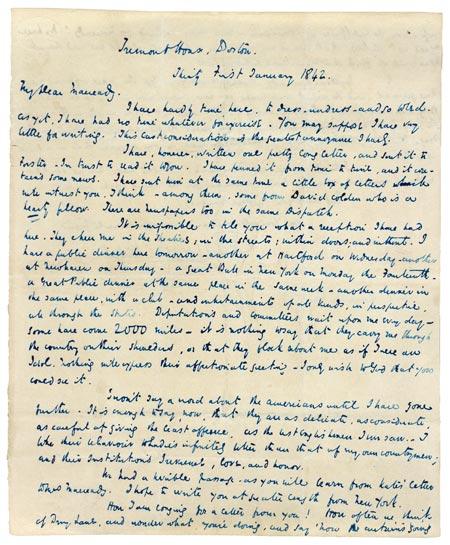
Autograph letter signed, Boston, 31 January 1842, to William Charles Macready
Acquired by Pierpont Morgan before 1913
Writing to Macready less than two weeks after his arrival in the United States, Dickens reported excitedly that, "It is impossible to tell you what a reception I have had here. They cheer me in the Theatres; in the streets; within doors; and without.... Deputations and Committees wait upon me every day—some have come 2,000 miles—it is nothing to say that they carry me through the country on their shoulders, or that they flock about me as if I were an Idol. Nothing will express their affectionate greeting—I only wish to God that you could see it." This attention and adulation was exhausting, however, and Dickens wrote to John Forster on 29 January that, "we are already weary, at times, past all expression."
America
Dickens visited the United States twice, first traveling extensively with his wife from 22 January to 7 June 1842. Twenty-five years later—from 19 November 1867 to 22 April 1868—he returned alone for an exhausting reading tour.
Prior to his first visit, he had "dreamed by day and night, for years, of setting foot upon this shore, and breathing this pure air." He received an unprecedented enthusiastic and extravagant welcome, as befitted the world's first literary superstar. But he soon grew tired of the intrusion resulting from his lionization. After making several vehement speeches in favor of an international copyright agreement that would protect his work from piracy in the United States, he was deeply hurt by the vitriolic response of the American press. His bitter disappointment is recorded in American Notes for General Circulation and his novel Martin Chuzzlewit (1843–44).
When Dickens returned in 1867, his fame, and the adulation it inspired, had intensified. In seventy-six public readings, he performed for more than one hundred thousand people and earned $95,000, equivalent to approximately $1.5 million in today's money.
My Dear Macready.
I have hardly time, here, to dress—undress—and go to bed. As yet, I have had no time whatever for exercise. You may suppose I have very little for writing. This last consideration is the greatest annoyance I have.
I have, however, written one pretty long letter, and sent it to Forster—In trust to read it to you. I have penned it from time to time, and it contains some news. I have sent him at the same time a little box of letters which will interest you, I think—among them, some from David Colden who is a hearty fellow. There are Newspapers too in the same Dispatch.
It is impossible to tell you what a reception I have had here. They cheer me in the Theatres; in the streets; within doors; and without. I have a public dinner here tomorrow—another at Hartford on Wednesday—another at Newhaven on Thursday—a great Ball in New York on Monday the Fourteenth—a Great Public dinner at the same place in the same week—another dinner in the same place, with a club—and entertainments of all kinds, in perspective, all through the States. Deputations and Committees wait upon me every day—some have come 2000 miles—it is nothing to say that they carry me through the country on their shoulders, or that they flock about me as if I were an Idol. Nothing will express their affectionate greeting—I only wish to God that you could see it.
I won't say a word about the Americans until I have gone further. It is enough to say, now, that they are as delicate, as considerate, as careful of giving the least offence, as the best Englishmen I ever saw.—I like their behaviour to Ladies infinitely better than that of my own countrymen; and their Institutions I reverence, love, and honor.
We had a terrible passage—as you will learn from Kate's letter to Mrs. Macready. I hope to write you at greater length from New York.
How I am longing for a letter from you! How often we think of Drury Lane, and wonder what you're doing, and say 'Now the curtain's going
